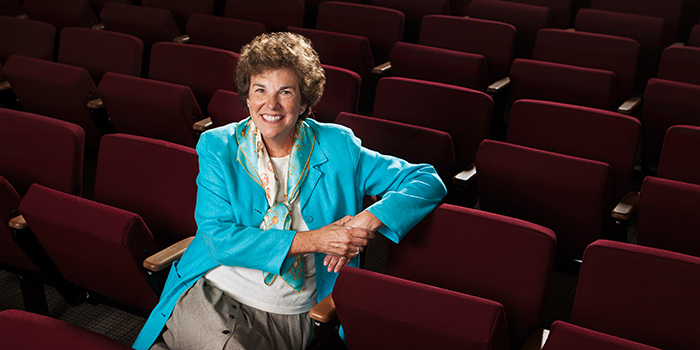Wendy Kaplan Works for Criminal Justice
As clinical professor in the Criminal Law Clinical Program, Kaplan prepares BU Law students to defend adults and juveniles in court.
 Wendy Kaplan, of Boston University School of Law’s Criminal Law Clinical Program, prepares students for criminal court cases where they will defend adults and juveniles accused of committing criminal offenses. In the adult context, this could mean a sentence of up to two and a half years. For juveniles, it could mean a commitment to the Massachusetts Department of Youth Services until age eighteen.
Wendy Kaplan, of Boston University School of Law’s Criminal Law Clinical Program, prepares students for criminal court cases where they will defend adults and juveniles accused of committing criminal offenses. In the adult context, this could mean a sentence of up to two and a half years. For juveniles, it could mean a commitment to the Massachusetts Department of Youth Services until age eighteen.
Kaplan first found herself drawn to defending the underrepresented when she worked a summer between her second and third year of law school at the Committee for Public Counsel Services, the public defender agency of Massachusetts.
“So many of my clients were poor, many were homeless, many suffered addictions,” says Kaplan. “It was important to bring into the courtroom a vigorous defense and an individual life story, so that there would be a fuller understanding of that person’s life, and how a crime fit in a context of their life.”
Kaplan began her career at BU Law in 1977, in what was then called the Criminal Justice Clinic. She was recently promoted to clinical professor of law. Her primary clinical work involves educating, training, and supervising third-year law students who represent defendants in criminal and delinquency trials.
“My students provide services to juveniles who are having family or domestic issues, who are facing learning difficulties, as well as issues of poverty that face both young adults and older adults who find themselves in the criminal justice system,” says Kaplan.
While working at the public defender’s office after law school handling felonies, misdemeanors, and trials, Kaplan was recruited by BU Law to supervise law students in their own work as public defenders. She says she always had an interest in both law and in education and curriculum development.
“Coming to BU was a way to bring those two different interests together. I was given the opportunity to be in a teaching position, but also to be in a professional legal advocate position,” says Kaplan. “I have the best of both worlds—I have the best job.”
Kaplan emphasizes the need to prepare students for the intensity of court—from the pre-trial hearings where discovery motions are going to be argued, all the way through to the trial, when the verdict is announced, and beyond to appellate review (if required).
“We prepare our students by going through a rigorous orientation, which includes classes where we break down steps in the criminal process. We expose our students to the issues that each step presents,” she says.
Legal clinics, to Kaplan, create important opportunities that enhance traditional doctrinal courses. The non-clinical classes that law students take provide a vital foundation for analyzing the legal issues they see in their client representation.
“Everything we do in the criminal trial clinic rests on the foundation that our students have received in other coursework such as constitutional law, criminal law, evidence, and professional responsibility,” says Kaplan. “We really put our students to the test by taking those theories they have learned and applying them in representation of real clients.”
Kaplan also teaches a seminar which explores the historical and legal foundations of the juvenile system.
“Understanding the historical and the legal framework for juvenile systems informs how we see the system today, and how we advocate for improvement of that system,” she says.
Outside BU Law, Kaplan was a board of delegates member of the Massachusetts Bar Association, where she chaired the Access to Justice Commission, among other assignments. She served on the board of the Massachusetts Law Reform Institute, and is a member of the Disproportionate Minority Contact sub-committee of the Juvenile Justice Advisory Committee, the state advisory group that oversees federal funding and grants from the Office of Juvenile Justice and Delinquency Prevention. In this capacity, she oversees efforts to reduce disproportionate minority contact within the juvenile justice system.
Kaplan is a long-standing member of the board of Suffolk Lawyers for Justice (SLJ), a non-profit organization that oversees private attorneys assigned to indigent representation in Suffolk County. These attorneys handle the defense of those cases that the public defender organization is unable to represent. Kaplan and the SLJ board ensure that the representation of clients is maintained at a high professional level.
“The importance of pro bono work is an aspect of lawyering that I seek to instill in my students,” Kaplan says. “I hope they come to understand that an engagement in social issues and a pursuit of social justice can be an integral piece of their professional lives. This is a mission for me.”
Reported by Natalie Carroll (COM’19)
Related News
- When Fleeing Police Isn’t Necessarily Incriminating
- John Sadek (’16) Joins the Committee for Public Counsel Services, Worcester District Court Office
- Two BU Law Clinics Partner with Graduate School of Social Work